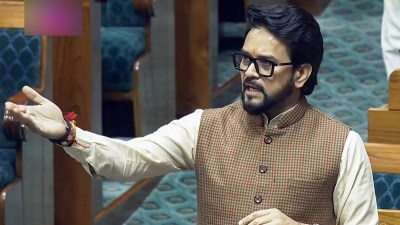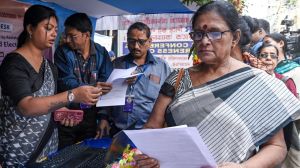NEET UG: Education Ministry analysing data to explore online mode of exam
Detailed deliberations have been conducted several times between the education and health ministries on whether to conduct the exam in pen-and-paper or online mode; however, the plan has not taken off yet.
 The committee headed by K Radhakrishnan had said in its report that computer-based tests with examinations in multiple shifts has become the “preferred mode of examination and a sure way forward” (Express Photo by Praveen Khanna/ representative)
The committee headed by K Radhakrishnan had said in its report that computer-based tests with examinations in multiple shifts has become the “preferred mode of examination and a sure way forward” (Express Photo by Praveen Khanna/ representative)The Education Ministry is in the process of analysing data on the infrastructure for computer-based tests (CBT), and is examining tests that have already been conducted in CBT mode to determine if students coming from rural or remote areas might be at a disadvantage when it comes to taking such tests.
This is in the wake of a committee constituted by the Ministry having recommended last year that entrance exams be conducted online wherever possible. The committee headed by former ISRO Chairman K Radhakrishnan, and formed amid the NEET UG paper leak furore, had submitted its report to the Ministry last year.
A senior official in the Education Ministry said that the availability of centres for computer-based tests will have to be ensured. The Ministry will also have to ensure that students coming from rural or remote areas don’t face any barriers that might put them at a disadvantage if entrance exams are shifted completely to CBT mode from pen-and-paper, the official said.
To assess these points, the Ministry is analysing data on the infrastructure for computer-based tests, and examining tests like the JEE, which are already conducted in computer-based mode, to determine the impact of computer-based testing on students from rural or remote areas.
For JEE Main, which is conducted in computer-based mode, a total of 12.58 lakh candidates appeared in the first session, and 9.92 lakh candidates appeared in the second session. NEET-UG, for which 22.09 lakh candidates appeared this year, was conducted in pen-and-paper mode. This year, CUET UG, for which 10.72 lakh candidates appeared, was a computer-based test that faced glitches in some centres.
The official in the Education Ministry said that a final call on whether NEET-UG is to be conducted in CBT mode will have to be taken by the Ministry of Health and Family Welfare.
The committee headed by K Radhakrishnan had said in its report that computer-based tests with examinations in multiple shifts has become the “preferred mode of examination and a sure way forward”. It recommended collaboration with Kendriya Vidyalayas and Navodaya Vidyalayas to develop digital infrastructure that will allow them to serve as computer-based testing centres.
Meanwhile, the Ministry had constituted a committee in June to discuss issues related to coaching and suggest measures to reduce students’ “dependency” on coaching centres. The committee is also expected to determine the “effectiveness and fairness of competitive entrance examinations.”
As part of its process, the committee is examining data on question papers of entrance exams after class 12 to determine whether there is a mismatch between the difficulty level of the entrance exam, and a student’s learning level in class 12, the official said. “There is a feeling among students and parents that some entrance exams cannot be given without coaching. The data analysis is to check if that is the case. If there is a mismatch, we will have to look at how we can correct that,” the official added.
- 01
- 02
- 03
- 04
- 05































